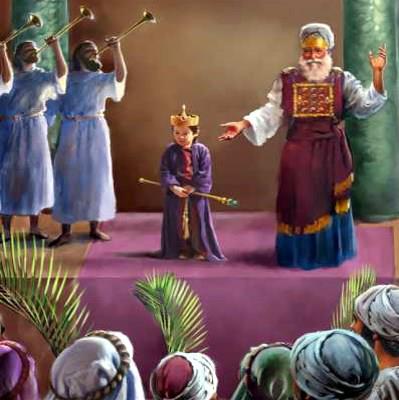
THE GOOD KING JOSIAH.
JOSIAH, the fifteenth king of Judah, lived about 550 years before Christ. He began to reign when he was very young,—only eight years old. His father, Amon, and his grandfather, Manasseh, were both very wicked kings, and led the people of Judah into many sins. Josiah, however, seems to have been very different from them; for from his earliest years "he did that which was right in the sight of the Lord, . . . and turned not aside to the right hand or to the left." Perhaps he had a good mother, who taught him the fear of the Lord.
In the eighth year of his reign, when he was but sixteen years old, he began to seek after the. Lord with all his heart; and in the twelfth year of his reign, he set about destroying the idols, and the high-places and groves used in their worship, with which Jerusalem had been filled by his wicked - fore-fathers. He then went throughout his kingdom in person, and caused the destruction of all the false gods and their priests and altars, and so far as it seemed -possible, cleansed the land from idolatry.
In the eighteenth year of his reign, Josiah commenced to repair the temple of the Lord in Jerusalem. While this was in progress, a book of the law of the Lord, written by Moses, was found by Hilkiah the priest. Now the people of Judah had gone so far into idolatry and wickedness that this book had probably been lost and forgotten; for when its words were read before the king, he wept, and rent his clothes. He knew that his people had not kept this law; and when he heard the terrible threatenings that were pronounced upon those who should do as they had done, he was greatly distressed. So he sent some of the priests and scribes to Huldah, a prophetess who dwelt in Jerusalem, to inquire of the Lord in regard to the fate of his people. She told them to tell the king that the Lord would indeed bring upon them all the judgments that were written in the book, because they had forsaken him and worshiped other gods; but because Josiah's heart was tender, and he had humbled himself before the Lord, and tried to rid the land of idolatry, the evil should not come in his day.
And King Josiah sent and gathered the elders of the people, and all who dwelt in Jerusalem, both great and small, to the temple of the Lord; and he read to them all the words of the law that was written in the book, which had been found. In the picture on this page we see him, arrayed in his kingly robes, with the highpriest by his side, reading to the multitude around him from this book of the law. The books of those days were simply long strips of parchment written on one side and rolled up. It is from such a book that the king is reading. At his left is the golden candlestick, which stood on the south side of the holy place; and on the walls may be seen the forms of the cherubim which were carved there.
When he had finished the, reading of the law, the king stood by a pillar, in the presence of all the people, and made a solemn covenant before the Lord, promising to 'keep his commandments with his whole heart, and to obey all that was written in the book. And he made all the people present promise to stand by this covenant.
The Passover that followed was the greatest that had been held since the days of Samuel, the prophet; and there was never another like it. To the poor people who were present, the king gave thirty thousand lambs and kids, and three thousand bullocks. The princes, following his example, also gave liberally, so that all the people were supplied with animals for sacrifice.
After this, Josiah foolishly went out to withstand Pharaoh necho, king of Egypt, at the pass of Megiddo, and there lost his life. 2 Chronicles 35:20—25. He died in the thirty-first year of his reign, and the thirty-ninth of his age, and was greatly mourned by all the people. "And like unto him there was no king before him, that turned to the Lord with all his heart and with all his soul and with all his might, . . . neither arose there any after him."
The good prophet Jeremiah lived in the days of Josiah, and was doubtless a strong helper to the pious king in his work of ridding the land of its idolatries, and establishing the downtrodden worship of the true God. We may imagine the grief of the prophet at the sudden and untimely death of his beloved king,—the sole prop and pillar of God's cause in the land. There is great fullness of meaning in the simple words Of the record, "And Jeremiah lamented for Josiah."
E. B. G.